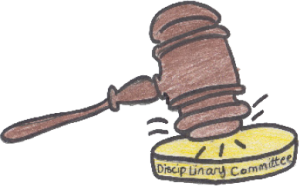Since joining the Dean’s Office three years ago, I have had many conversations with students, faculty and parents surrounding the subject of discipline at Deerfield. As expected, there is a wide range of perspectives and opinions pertaining to the topic and purpose of discipline. What struck me early on was hearing students, faculty and parents using the word “punishment” to discuss discipline issues on campus. “As a punishment you will” or “My punishment was” or “Students should be punished for”…

Let’s first agree on a few fundamental facts of school life. Every school in America, public or private, has a student handbook, and every school has someone who handles discipline issues. Deerfield is no different. All of us would agree it would be impossible to run our school without rules and guidelines. The question is, is it really important for us to think of our disciplinary model as one of consequences and learning as opposed to one of punishment and shame?
My entire Catholic school experience from K-12 used a punitive model of disciplinary action. Sister Mary Beatrice would yank you out of your chair by your ears, whack your knuckles with a ruler, stick a bar of soap in your mouth, or put you in a dark closet, and that was first grade! At Don Bosco High School, Brother Julius smacked kids on a regular basis. As I watched a coach stuff my teammate into a locker one day, I just put my head down and said to myself, “Good luck, pal, see you at practice.” I look back on these days with not only a level of amusement, but also a level of disbelief.
We’ve come a long way since the 60s and 70s. Our model of consequence and restorative practices here at Deerfield is different from past models of punishment and shame. Punishment is more in line with paying your dues, feeling bad and then moving on. The experience is best summed up in the sentiment, “I got caught doing this, so I must pay a price.” A system of consequence and restorative practices, in contrast, asks students to learn from their mistakes with the hope that they will stop, think, and reflect upon their decision-making in the future.
Whether it is a letter of reprimand or being expelled from school, all consequences are conceived as a result of an administrative philosophy that aims to lead students to self-reflection. We use the expression “building character” often, but building true character takes place when you are free to break a rule or do something inappropriate but you choose not to. The growth comes from making a conscious choice, not because you are afraid of getting caught, but because you know the wrong choice is inappropriate and potentially hurtful to yourself and others. This is the mindset that is truly reflective of growth and maturity.
They say, “The truth is in the pudding,” and I can say with pride that at Deerfield our numbers do not lie: 97 percent of Deerfield students who appear in front of a D.C do so only once. This statistic tells us that our model of consequences and restorative practices outweighs one of punishment and shame by a large margin.
As a student body, Deerfield is second to none. I have tremendous respect and admiration for every student and adult who works at this beautiful and historic school. Making mistakes in life is human: learning and benefiting from those mistakes is a valuable gift that will hopefully last a lifetime.
Be Worthy!